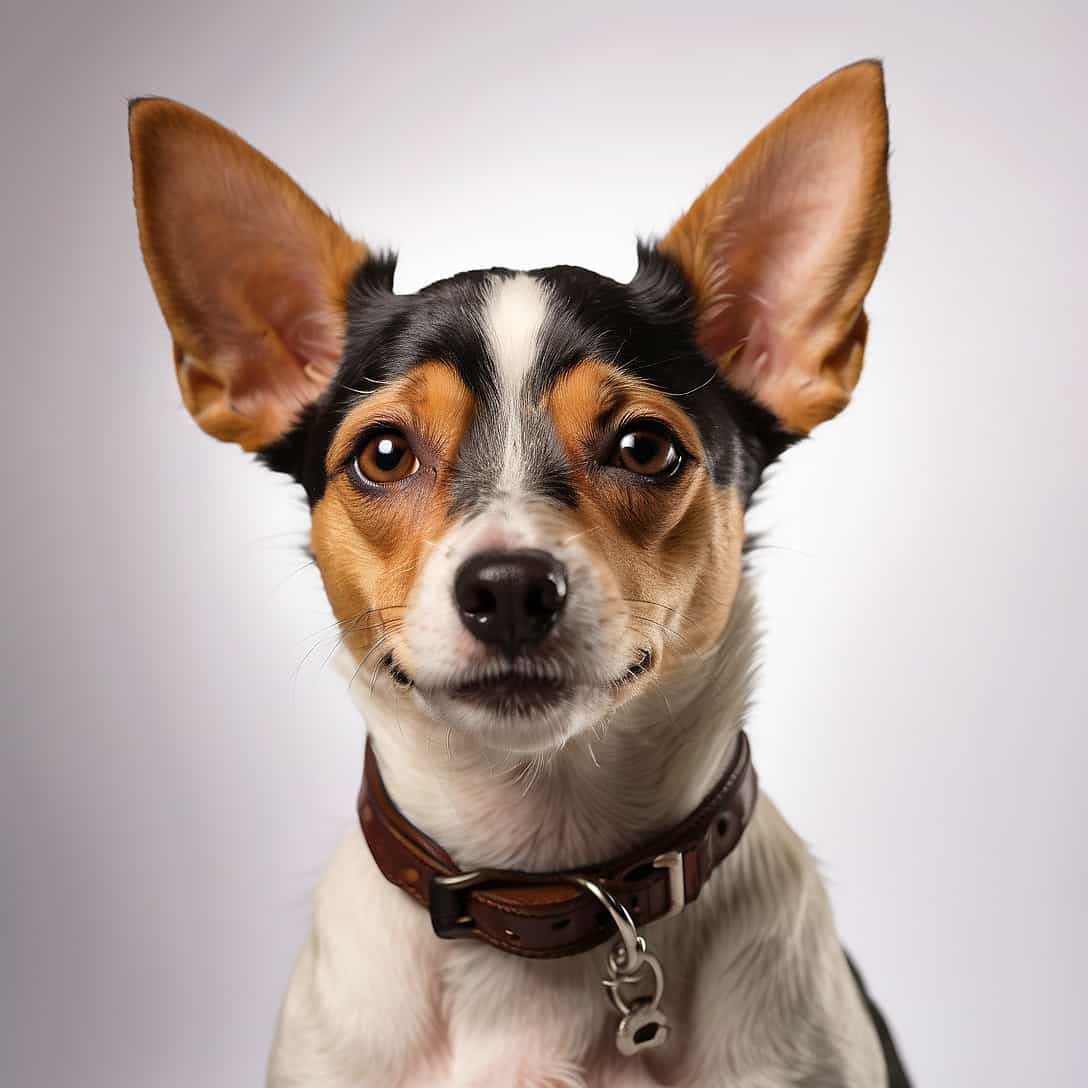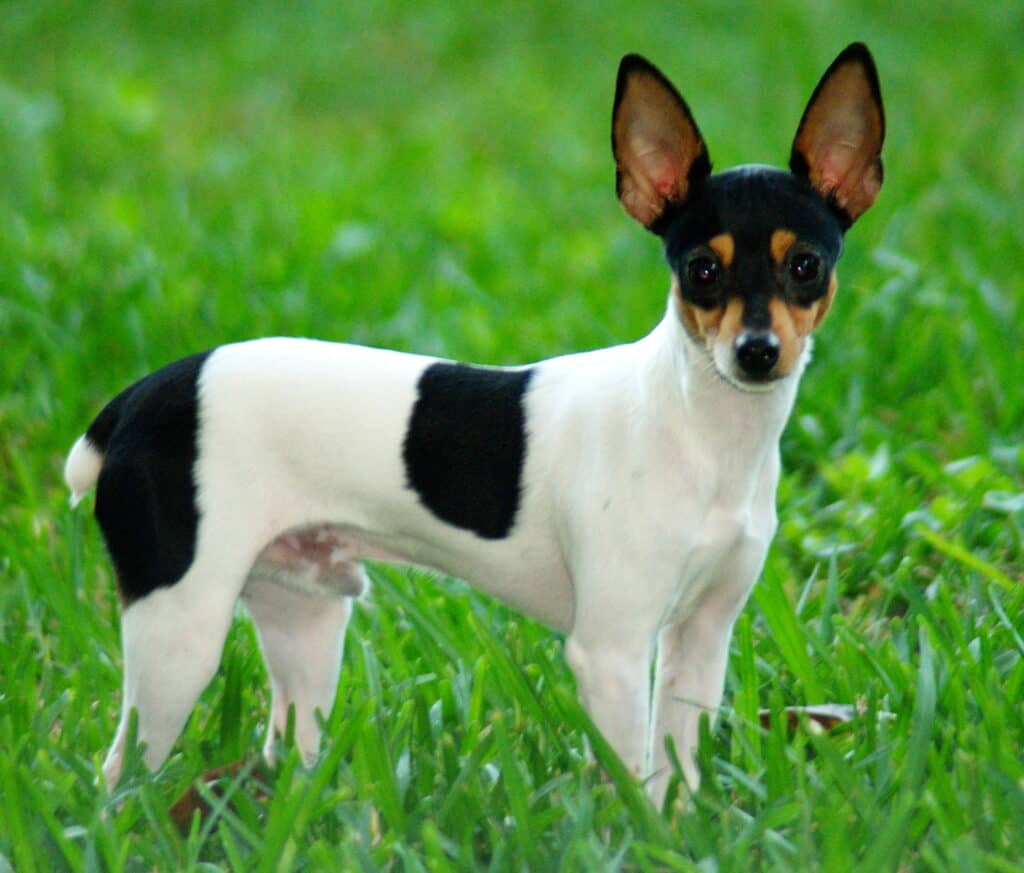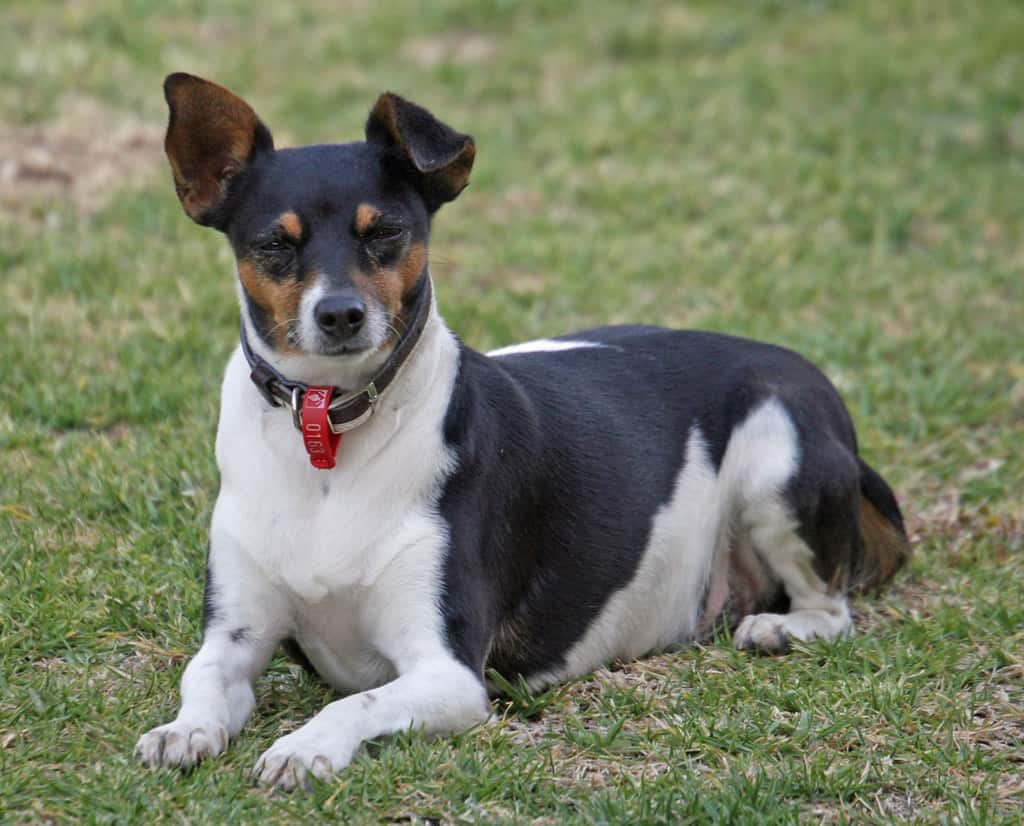The Toy Fox Terrier, a diminutive and lively breed, is known for its intelligence, agility, and charming personality. With a sleek coat and distinctive markings, this terrier captures attention with its adorable appearance. Despite its small size, the Toy Fox Terrier is a spirited and energetic companion, excelling in various dog sports and forming strong bonds with its family. This breed brings joy and entertainment to households seeking a dynamic and affectionate four-legged friend.

| Category (Explanation) | Breed Information |
|---|---|
| Year of Breed Conception | 1930s |
| Country of Origin | United States |
| Weight (lbs & kg) (Male) | 3.5-7 lbs (1.6-3.2 kg) |
| Weight (lbs & kg) (Female) | 3.5-7 lbs (1.6-3.2 kg) |
| Coat Type | Short and smooth |
| Color Variations | Tri-color, predominantly white with tan and black markings |
| Shedding Level (Low, Moderate, High) | Low |
| Height (cm & in) | 8.5-11.5 inches (22-29 cm) |
| Breed Size | Small |
| Trainability (Low, Moderate, High) | High |
| Mental Needs (Low, Moderate, High) | Moderate |
| Intelligence Level (Low, Moderate, High) | High |
| Energy Level (Low, Moderate, High) | Moderate |
| Agility (Low, Moderate, High) | Moderate |
| Loyalty (Low, Moderate, High) | High |
| Playfulness (Low, Moderate, High) | High |
| Exercise Needs | Moderate exercise and playtime |
| Guarding Proficiency (Low, Moderate, High) | Low |
| Sociability with Children (Low, Moderate, High) | High |
| Barking Level (Low, Moderate, High) | Moderate |
| Digging Tendency (Low, Moderate, High) | Low |
| Destructive Behavior (Low, Moderate, High) | Low |
| Drooling Level (Low, Moderate, High) | Low |
| Obedience Level (Low, Moderate, High) | High |
| Apartment Friendly (Yes/No) | Yes, with sufficient exercise |
| Inherent Prey Drive | Moderate |
| Physical Risk to Others (Low, Moderate, High) | Low |
| Travel Fatality Risk (Low, Moderate, High) | Low |
| Allergen Potential | Low |
| Health Concerns (List of Common Health Concerns) | Luxating Patella, Legg-Calve-Perthes Disease |
| Average Life Expectancy (Life Expectancy in Years) | 13-15 years |
Woof Mastery is reader supported and our articles may contain affiliate links.
Instead of running third party ads that we have no control of we only use links from high-quality companies we are directly partnered with. Making use of these links come at no cost to you our reader, and in many cases have the extra benefit of discounted rates or sign up bonuses.
If you’re interested you can read more about our affiliate policy here.
We appreciate your support and always insure that the products and services we recommend are high-quality, helpful and relevant to the subject at hand!
The Toy Fox Terrier, developed in the United States in the early 20th century, has a history rooted in its role as a skilled ratting dog. Bred from various small terriers, including the Smooth Fox Terrier and Toy Manchester Terrier, this breed excelled in controlling vermin on farms and in urban settings. The Toy Fox Terrier’s small size, agility, and friendly disposition led it to become a popular companion, valued for its intelligence and playful nature. Its history reflects its journey from a working terrier to a delightful and affectionate family pet.

The Toy Fox Terrier is special for its intelligence, agility, and charming personality. Bred for ratting in the early 20th century in the United States, this terrier excels in various dog sports and activities. What sets it apart is its ability to form strong bonds with its family, bringing joy and entertainment to households. The Toy Fox Terrier’s small size, coupled with its dynamic nature, makes it a special addition to families seeking a lively and affectionate four-legged friend. Its versatility and delightful demeanor contribute to its special status as an engaging and treasured companion.
The Toy Fox Terrier’s traditional role began in the early 20th century in the United States, where it was developed for ratting and as a skilled vermin controller. Bred from various small terriers, including the Smooth Fox Terrier and Toy Manchester Terrier, this breed excelled in its ability to control pests on farms and in urban settings. Today, the Toy Fox Terrier continues its traditional role as a delightful and affectionate family companion, showcasing its intelligence, agility, and playful nature. Its small size and spirited personality contribute to its traditional role as a lively and engaging four-legged friend.
Toy Fox Terriers are known for their intelligence, agility, and charming personality. Bred for ratting, they excel in various dog sports and activities. These terriers form strong bonds with their families and bring joy and entertainment to households. Toy Fox Terriers are characterized by their small size and dynamic nature. They become special additions to families seeking a lively and affectionate four-legged friend. With their versatility and delightful demeanor, they become engaging and treasured companions, showcasing a spirited and loving personality to those who welcome them into their lives.
Toy Fox Terriers are known for their intelligent and charming temperament. Bred for ratting, they showcase a lively and affectionate nature. With proper training and socialization, they become engaging and well-behaved family companions. Toy Fox Terriers are typically affectionate with their families and enjoy play and activities. Proper introductions are important around other dogs. With their small size and spirited personality, they bring joy and entertainment to households. With consistent positive reinforcement, Toy Fox Terriers develop into delightful and spirited family members, showcasing a lively and engaging temperament.
Toy Fox Terriers are small, elegant dogs with a well-proportioned and athletic build. They have a distinct head with a short muzzle and a well-defined stop. Their eyes are dark and expressive, and their ears are large and erect. The breed is known for its short, smooth coat that comes in various colors, including white with black, tan, or tricolor markings. Toy Fox Terriers have a straight back, a high-set tail, and a lively gait. They convey a sense of agility, intelligence, and a charming, toy-like appearance.
Toy Fox Terriers come in various colors, including white with black, tan, or tricolor markings. The breed’s coat is short, smooth, and sleek, highlighting its elegant and athletic build. Toy Fox Terriers may have distinct markings on the head, body, and tail, and their coat colors should be vibrant and well-defined. The breed’s small size, alert expression, and playful personality make it a delightful and entertaining companion.
Toy Fox Terriers come in various coat patterns, including white with black, tan, or tricolor markings. The breed’s coat is short, smooth, and sleek, highlighting its elegant and athletic build. Toy Fox Terriers may have distinct markings on the head, body, and tail, and their coat patterns should be vibrant and well-defined. Variations in coat pattern contribute to the breed’s charming and toy-like appearance. The small size, alert expression, and playful personality make Toy Fox Terriers delightful and entertaining companions.
Toy Fox Terriers have a low shedding level. Their short, smooth coat sheds minimally, and regular grooming is important to maintain coat health. Brushing the coat once or twice a week helps remove loose fur and prevents matting. While Toy Fox Terriers are not heavy shedders, grooming practices contribute to the overall well-being of their coat.
Toy Fox Terriers have a short, smooth coat that is relatively low-maintenance. Here are some grooming habits for Toy Fox Terriers:
Toy Fox Terriers have a moderate activity level. Despite their small size, they are lively and enjoy playtime. Daily walks and interactive toys can help meet their exercise needs. Toy Fox Terriers also benefit from mental stimulation through training sessions and puzzle toys. While they are not excessively hyperactive, providing opportunities for both physical and mental engagement is essential for their well-being.
Toy Fox Terriers possess intelligence in their small, lively package. Their quick learning abilities and adaptability make them responsive to training. Positive reinforcement methods and interactive play contribute to their overall intelligence. Their energetic and affectionate nature adds a delightful touch to their intelligent behavior.
Toy Fox Terriers thrive on mental stimulation. Engage them in activities such as puzzle toys, interactive games, and obedience training to challenge their minds. Regular social interaction is crucial, as they are social dogs. Obedience training contributes to mental stimulation and strengthens the bond with their owners. Establishing a routine, offering affection, and creating a safe environment contribute to their mental well-being.
Enter The Woof Mastery

Before welcoming a Toy Fox Terrier into your home, consider the following:
Toy Fox Terriers, being small in size, generally pose a lower physical risk to others. However, like any dog, they may exhibit behavioral issues if not properly socialized and trained. Early socialization and positive reinforcement training are essential to ensure they interact well with people and other animals.
Toy Fox Terriers, being small in size, are generally well-suited for families with children. Supervision is important, especially with very young children, to ensure gentle interactions. Early socialization is crucial to shape their behavior around kids. They can be affectionate and form strong bonds with children, making them suitable companions for families.
Toy Fox Terriers may have mixed responses to water. Some individuals may enjoy swimming, while others may not be as comfortable. If you plan to introduce them to water, do so gradually and observe their comfort level. Always prioritize safety and use a canine life vest if needed.
Remember that Toy Fox Terrier puppies, like all puppies, are eager to please and learn. Positive and consistent training practices will help them become well-behaved, obedient, and happy adult dogs. Building a strong and trusting bond with your puppy through training is a rewarding experience for both you and your canine companion.
Toy Fox Terriers may be vocal, and they can bark to express themselves or alert their owners. Early training and socialization are crucial to managing their barking tendencies. Positive reinforcement methods can be effective in shaping their behavior and preventing excessive barking.
Toy Fox Terriers do well in homes with attentive owners. They adapt to various living conditions, including apartments and houses with yards. Regular playtime and short walks meet their exercise needs. Socialization is important to prevent shyness or aggression. Positive reinforcement training is effective in shaping their behavior.
When traveling with Toy Fox Terriers, consider their small size and potential fragility. Use a secure and well-ventilated carrier for their safety. Pay attention to temperature conditions and avoid leaving them unattended in hot environments. Provide frequent breaks for stretching, hydrating, and bathroom breaks. Secure them appropriately in a vehicle to prevent injuries. If flying, choose airlines with policies suitable for small breeds and ensure compliance with crate requirements for air travel safety.
Toy Fox Terriers may be prone to specific health concerns. While not all individuals will experience these issues, it’s essential for owners to be aware of potential health problems and work with veterinarians to maintain their pets’ well-being. Common health concerns in Toy Fox Terriers include:
Regular veterinary check-ups, a balanced diet, proper exercise, and responsible breeding practices can help mitigate some of these health concerns. It’s crucial for Toy Fox Terrier owners to work closely with their veterinarians to monitor their pets’ health and address any issues promptly.
Proper nutrition is crucial for the health and well-being of Toy Fox Terriers. Here are some nutritional habits and best practices to consider for this breed:
Breed-Specific Laws (BSL): Toy Fox Terriers may be subject to breed-specific laws (BSL) in certain areas. These laws are often enacted at the local or municipal level and can vary widely from one jurisdiction to another.
Types of Restrictions: The specific restrictions imposed on Toy Fox Terriers under BSL can include mandatory spaying/neutering, special licensing, liability insurance requirements, muzzling in public, and, in some cases, bans on ownership. The severity of these restrictions depends on local regulations.
Rationale for BSL: BSL is typically implemented based on concerns about public safety and perceived risks associated with specific breeds, often due to incidents involving dog attacks. While Toy Fox Terriers are not inherently aggressive, they can be affected by BSL due to their physical resemblance to breeds that are sometimes included in these laws.
Controversy: It’s important to note that BSL is a controversial topic. Critics argue that it unfairly targets breeds rather than addressing individual dog behavior and that responsible ownership and training should be emphasized instead of breed-specific restrictions.
Local Regulations: To determine if there are breed-specific laws or restrictions regarding Toy Fox Terriers in your area, you should check with your local animal control or government authorities. Be aware of and comply with any local regulations to ensure that you are in compliance with the law while owning a Toy Fox Terrier.
Woof Mastery is reader supported and our articles may contain affiliate links.
Instead of running third party ads that we have no control of we only use links from high-quality companies we are directly partnered with. Making use of these links come at no cost to you our reader, and in many cases have the extra benefit of discounted rates or sign up bonuses.
If you’re interested you can read more about our affiliate policy here.
We appreciate your support and always insure that the products and services we recommend are high-quality, helpful and relevant to the subject at hand!
Myth 1: Toy Fox Terriers are Only Suitable for Experienced Owners
Myth 2: They are Hyperactive All the Time
Myth 3: Toy Fox Terriers are Fragile and Delicate
Myth 4: They are Yappy and Excessive Barkers
Myth 5: Toy Fox Terriers Require Minimal Exercise
Myth 6: They Don’t Get Along with Other Pets
Myth 7: Toy Fox Terriers are High-Maintenance in Grooming
Myth 8: They are Difficult to Train
Myth 9: Toy Fox Terriers are Lap Dogs Only
Myth 10: They Don’t Need Socialization
Understanding the true nature of Toy Fox Terriers dispels common misconceptions and highlights the importance of providing appropriate care, training, and socialization for these spirited and affectionate companions.
Famous Toy Fox Terrier examples are not as widely documented, but these lively and intelligent dogs can be found as beloved pets in homes where their small size and playful nature are cherished.
The Toy Fox Terrier is culturally significant as a small and intelligent breed with a lively personality. Known for their sleek coat and friendly demeanor, Toy Fox Terriers have become popular as both companions and in dog sports. Their presence in popular media, including advertisements, contributes to their cultural appeal. Toy Fox Terriers are symbols of agility and charm, finding appreciation among those who value their small size and playful nature.
Famous historical owners of Toy Fox Terriers are not as extensively documented, but these small and intelligent dogs with a lively personality have become popular as companions. Their sleek coat and friendly demeanor make them well-suited for both households and dog sports. While specific historical figures may not be widely known, Toy Fox Terriers continue to be valued for their small size and playful nature.
Toy Fox Terriers, like many small breeds, have faced specific challenges over the years. Some notable challenges include:
The Toy Fox Terrier is a small breed that originated in the United States and was developed for companionship. It is believed to have been created through the combination of several breeds, including:
Toy Fox Terriers are delightful and lively companions that bring a small bundle of joy to every home. Known for their small size and playful nature, they make ideal companions for families and individuals alike. Their adaptability to various living conditions allows them to fit seamlessly into urban and suburban settings. Engaging in interactive play and providing them with the attention they crave strengthens the unique bond they share with their families, making them treasured members of the home. With their charming appearance and spirited demeanor, Toy Fox Terriers bring both companionship and delight to individuals and families.